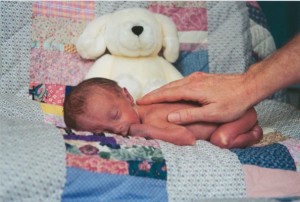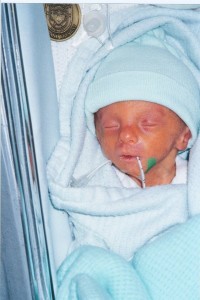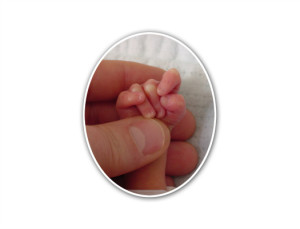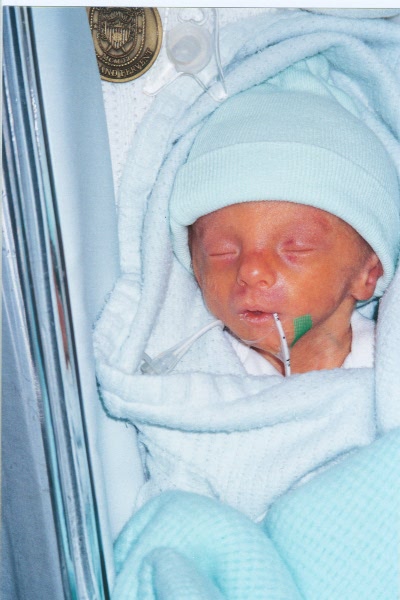Baby’s name: Isaac Quinn
Parents’ names: Don and Victoria
Birth Date: February 19, 2001
Angel Date: March 2, 2001
Hometown: Northern Virginia
Isaac’s Story
Every life . . . no matter how fragile or brief, forever changes the world.
They returned home to Bahrain without their son, having left to go to Germany just 3 weeks earlier, excited with anticipation about the deliver of their first baby. Only 3 weeks had passed, yet it was a lifetime during which Don and Victoria’s world had been turned upside down. Stationed in Bahrain, they had flown 15 straight hours to Ramstein AFB Germany where they were to deliver their son, arriving at 10:30pm. As a precautionary measure, they were asked to stop by Labor and Delivery at the hospital before checking in at billeting. Within 5 minutes of getting hooked up for a non-stress test (something they never did in Bahrain) they realized Isaac’s heart was taking major decelerations and no one knew why. That heroic doctor on call that night had to make some very difficult decisions on the spur of the moment with no real information; and she made the right calls. People came running from all directions, called in from everywhere late on a Sunday night, on a holiday weekend, as they rushed Victoria into the operating room. The doctor delivered Isaac by c-section and saved his life.
Victoria’s pregnancy had gone smoothly. She had an ultrasound at 20 weeks where they said everything was fine. For that reason, she and Don chose not to go off island for an amniocentesis. The doctors in Bahrain still felt that everything was fine at 30 weeks, even though they recommended another detailed ultrasound because their child was measuring small for his age. “But why?” Victoria kept asking. “Everything’s fine, he’s just small,” they said. She researched IUGR thoroughly and it didn’t seem to fit. Her nagging thought was that there has to be a cause, a diagnosis. Yet at the 20 week U/S they had ruled out major chromosomal abnormalities. “Everything is fine,” they said.
And so, after the desperate flurry of activity, they finally got to meet their sweet Isaac. He was very small, only 3 lbs, 2 oz, but he was beautiful. Then they heard the words “Trisomy 18” for the first time, and within a few hours everything had changed forever. Although the doctors didn’t tell them it was “incompatible with life”, they did say it was generally a fatal condition that takes most babies in their first year, often in the first month of life. Victoria recalls, “I remember when I first was alone in my room at the hospital after seeing Isaac in the NICU for the first time and learning that he probably had Trisomy 18 — and what that meant — that I cried and pleaded with God, asking, will I never get to be a parent? And then I knew. . . I was a parent. I had a son and he needed me very much. Isaac made Don and me parents, our greatest wish; and this tiny beautiful little boy gave that to us forever.”
Isaac was born Feb. 19 and lived 11 days. They never got to bring him home because they were overseas, stationed with the Navy. But the hospital staff was very supportive of them as a family and they moved him out of the NICU and down to a room in the pediatrics ward where they could take over his care and be a family together. He was doing really well and Don and Victoria thought they would have him with them for a while, but they had decided that they wanted to provide only comfort care and signed a DNR.

They didn’t come to that decision lightly. They continually asked themselves “what is our goal for our son’s life?” each time there was a new development with new information or decisions to consider. Their goal was for his life to be lived as comfortable and free from unnecessary pain and suffering as possible. But they still had to decide what that meant.
When they had a full picture of his condition, when all the tests and scans and ultrasounds and blood tests were completed, their questions for the doctors centered around how various parts of his bodily functions (his heart, his kidneys, his liver, his lungs, his digestive tract) might deteriorate — what they could expect would go first and how he would experience that. The consensus was that probably heart failure would ensue the soonest and that they could administer Lasix and other medications to keep him comfortable and out of distress when that process began to accelerate.
“We wished with all our might that we did not have to face making these decisions,” remembers Victoria. “Wasn’t there someone else out there who would take the responsibility? Just tell the doctors to make the decisions and do everything medically possible to fight away every possible symptom? Couldn’t we just let God handle it? Wasn’t avoiding making decisions, a decision? Would treating symptoms change that he had Trisomy 18 when all was said and done? What kind of life would we be committing our son to so that we didn’t have to confront the pain of saying goodbye so soon? We didn’t want to have to take responsibility for choosing. We thought all these thoughts.”
Then Don and Victoria set to work at doing what they had so long dreamed of: parenting Isaac. They treasured each moment with him, creating memories of his precious life. Victoria writes, “Except for being small (3Ibs. 20z.) he looked and behaved like any other little newborn to us except that he needed to be fed through a gastric tube, so I pumped breast-milk for him. He cried when he was hungry or wet. He didn’t like having his diaper changed because it was cold and Mommy didn’t have one of those warmers to make those wipes less cold. He liked to be held, especially skin-to-skin on his Daddy or Mommy’s chest. He liked that the best of all. He liked to get all wrapped up in those soft receiving blankets, but Daddy wasn’t very good at it even after Mommy showed him how to do it like wrapping a burrito. We often called him ‘our little burrito’ after that. Sometimes when his Daddy would unwrap him to feed and change him, he would stretch his little arms all out above his head and then hold his little left arm up in the air — like he wanted to ask a question in school. So his Daddy would laugh and ask him, ‘Son, do you have a question? Well son, go ahead and ask your question. What do you want to know?’ And then we would make up funny things he might want to be asking. . . Like. . . Daddy, why are you so big and I’m so small? Why is my diaper wet? Can’t you hurry it up down there? Why does Mommy’s breast-milk taste like ice cream?
“We gave him love. We gave him time in our arms and in our lives outside of the NICU. We gave him space to be free of monitors and interventions. We gave him sunshine through the window and showed him the snow coming down. We played him beautiful music and some not so beautiful so he’d know the difference. We gave him time to show us, the new parents, just why you make sure to move fast when you are diapering a little boy — whew, could he get it everywhere. We gave him time to initiate his Daddy in handling the poopiest diaper ever, even dripping out the sides. We gave him time to be held by all the nurses and doctors who wanted to see him and say goodbye when we knew the end was nearing. We held him and loved him and we loved him enough to let him go when it was his time.
“There was this peace that came to his father and me after we accepted that he was going to die. We didn’t know if it would be this day, this week, this month, or a year or more from then. But we knew he would die. This was not the doctors telling us he would die. This was us knowing inside ourselves in the peace where I think God talks to us, that inner knowing. From that moment on, out of love for our son, and as his guardians on earth, we made every decision we had to make based on what would ensure his life and passing would be as free from suffering and pain as possible.”
When he was 9 days old, Isaac started having apnea episodes. This came as a surprise; they had been expecting heart failure. They had begun to think he would be with them for a while because he was doing so well, but then the apnea began. Victoria recalls, “For 36 hours, our Isaac stopping breathing at least once an hour, and toward the end going as long as 15-18 minutes before he would come back and start breathing again. . . my God he was so strong! We thought we were ready and prepared to let him go and let him pass peacefully until it all started that Wednesday evening when he first turned blue and stopped breathing, but we weren’t. His Daddy was holding him and saying over and over again, while we both cried, ‘Not yet, little buddy. Not yet.’ And he came back to us over and over again during the next 36 hours.
“Later Friday afternoon, when his Daddy and I were sitting quietly with him weathering each of these hourly episodes, I looked at Don and said, ‘I’m ready to let go.’ And he looked at me, and said, ‘Me, too,’ with a tear coming down his cheek. “We love you Isaac, and if it is your time, it is o.k. to leave us. Dear Lord, we commend onto to you the spirit of our most precious child. Please gather him into your loving arms.” And in the next five minutes, when the next episode began, Isaac just let go and this time didn’t come back. And his little heart stopped beating.
“It was simultaneously the most beautiful and horrible moment, but I felt angels all around us. He was laying on my chest, near the window, with the sun streaming in on his little head and body, and his Daddy right beside us. That was his moment. That was when he chose to leave. He chose well. And Don and I knew later as we talked about it, and we remembered what we had just said to each other a moment or two earlier before he left—that he had been waiting for us. For us to be ready to let him go. And we held each other and cried feeling how much we had all been a family together, how much a part of each other we all were. Isaac knew and he loved us too. It was his gift to us to wait until we were all truly ready to say goodbye.”
After saying goodbye to Isaac, Victoria found ways to heal. In the months after his loss, she wrote, “I have to talk and share about my own experience, about the details of what happened to my family and my son to heal. I have to or I can get very depressed. I have to keep opening my heart and feel all that is in there. And it hurts. But when I can and when I do it deeply, I find beyond the pain and behind the fears — is love. Love is what I reconnect with. The love I felt and feel for my dear baby son, for my dear husband and his pain and his love for his son, for my dear friends here who know the pain AND the love for their children with me. I am not alone.” She also found comfort in working on Isaac’s pictures and caring for them. But the greatest source of healing and comfort for Don and Victoria was the support found participating in this Community with other parents who shared the experience of loving a child with Trisomy 18.
Isaac is buried at Beaufort National Cemetery in South Carolina. Don’s parents were so caring and handled Isaac’s burial for them in the states when the military transport couldn’t get them there. Victoria writes, “Our little Isaac’s marker has ‘dear baby boy’ on it, and I like to think of all those other proud soldiers welcoming in their little friend, and making him their little buddy. Isaac would like that.
Postscript written by Victoria on the occasion of Isaac’s birthday many years later:
As hard as it is to face all the choices we must in learning about Trisomy 18 prenatally, I know if we had gotten Isaac’s diagnosis earlier in the pregnancy, we would have considered terminating, based on how our doctors knew how to explain the condition to us (and other parents) back in 2001. When I really listened to the stories of ALL parents making choices, I realized that the same struggles my husband and I faced in making decisions for Isaac about DNRs and surgeries all seemed so like the same concerns and struggles parents who choose to “say early goodbyes” expressed in our Online community at www.trisomy18support.org when they made choices to interrupt their pregnancies. They loved their children just as much as Don and I loved Isaac. These were all wanted children, not children rejected because they were not perfect. There were medical decisions, gut-wrenching, medical decisions about end-of-life care when a child is dying or expected to die. Out of the same love for our child we felt after his birth—we would have thought very seriously about the risk of him being born and fearing that he might experiencing nothing but pain and suffering. We had no information and no connections with other parents in 2001. But I know our fears are fears shared by all families when first learning about Trisomy 18 –whether prenatally or after birth as a surprise, as we did.
We had to learn everything we could under the pressures of time and urgent medical crises while overseas in Feb. 2001, and we felt so helpless without the knowledge of his condition to prepare ourselves to be the best parents we could be for Isaac as we was — not to the fantasy child who we imagined before knowing Isaac. We needed so much more than we had access to at the time for caring for THIS beautiful little son, perfect in his own way, that had Trisomy 18 damaging his body very severely in ways that seemed un-treatable except through many, many surgeries that would likely kill him. He was so, so small. Thankfully, our son was still largely spared any suffering as he passed through our lives; he passed very peacefully in our arms. I know how very blessed we were to be together as a family for our 11 days. Many families never get that chance. I know that now. But I also know that we made the best decisions we could with the available knowledge we had at the time and completely and utterly out of love for our son. And if we had a prenatal diagnosis of Trisomy 18, we would have made medical decisions for our son with just as much love.

We had 11 beautiful days. But we are also grateful that Isaac only had 11 beautiful days where he knew very little pain and now he will have that forever. Now his beautiful little soul knows no illness or infirmities. He is free. Our dearest baby boy.
_______________________________________________________________________________
Victoria Miller with the support of her husband Don is the Founder of the Trisomy 18 Foundation. They live in Northern Virginia today with their 2 feline rascals. They have no other children. Isaac was their only child.

